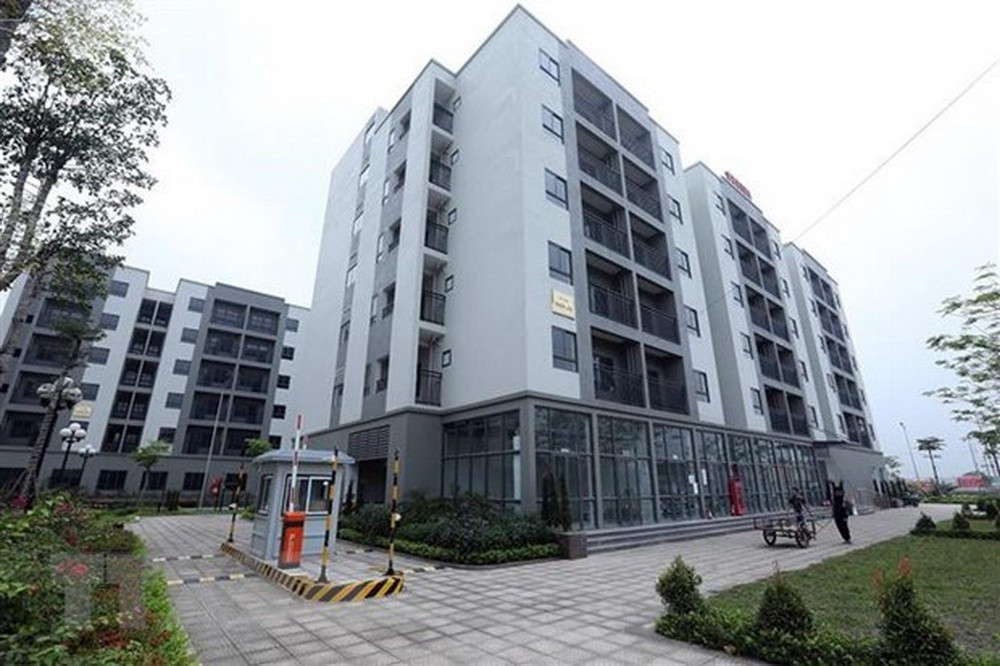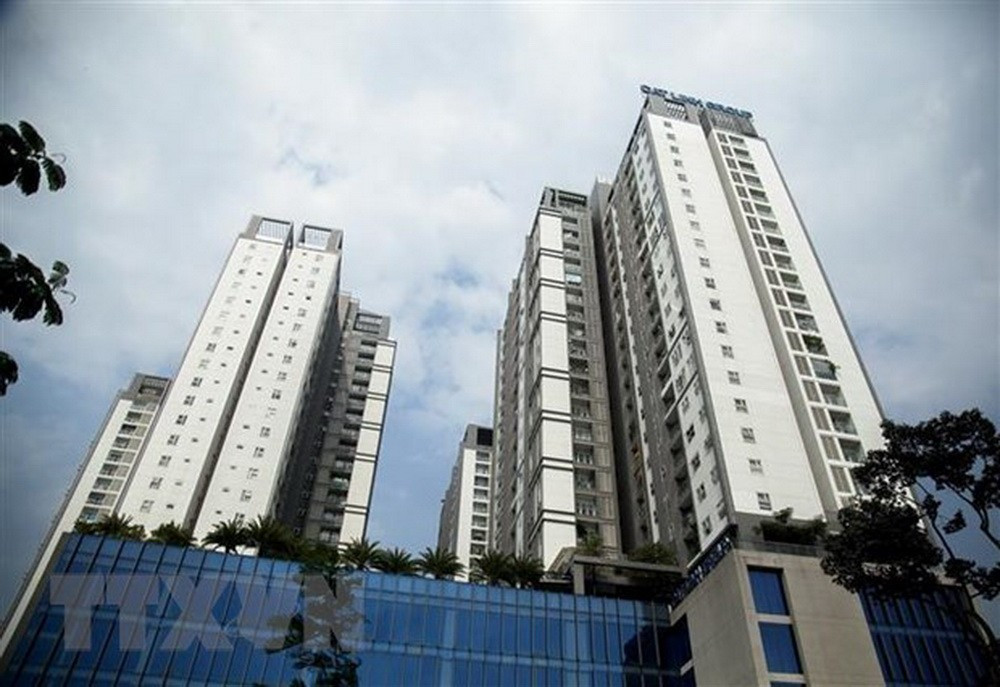According to feedback from localities and associations, hundreds of commercial housing construction investment projects across the country are currently stuck and cannot be implemented.

The pilot project to implement commercial housing projects through agreements on receiving land use rights or having land use rights for other land was organized by the Ministry of Natural Resources and Environment to collect opinions from ministries, branches, localities, and associations and collect them before March 10.
This is one of the contents in Document No. 73/TB-VPCP of the Government Office announcing the conclusion of Deputy Prime Minister Tran Hong Ha.
At the same time, the Ministry of Natural Resources and Environment sent the dossier to the Ministry of Justice for appraisal and submitted a proposal to draft a resolution of the National Assembly on piloting the implementation of commercial housing projects through agreements on receiving land use rights or having land use rights for other land and piloting the separation of compensation, support, resettlement, and site clearance into independent projects.
In particular, the pilot implementation of commercial housing projects with other land has attracted public attention with the expectation that this is an important solution, helping to solve difficulties for real estate projects that are having to stop due to legal deadlocks related to land. Thereby, helping to increase supply for the real estate market; at the same time, solving difficulties for businesses.
According to the feedback from localities and associations, there are currently hundreds of commercial housing construction investment projects across the country that are stuck and cannot be implemented due to the regulation that requires the origin or part of the residential land area to be able to implement a commercial housing project; of which Hanoi has about 82 projects, Ho Chi Minh City has about 126 projects...
This causes damage to businesses, reduces project supply and makes the market scarce in housing products. Therefore, this is also one of the reasons why housing prices have been pushed up over the past time.
Experts say that the current urbanization rate is fast, the population is moving to big cities. If the housing supply is not expanded, demand will always exceed supply, housing prices will continue to increase. Currently, housing prices in Vietnam are considered too high compared to the average income of society. Therefore, implementing commercial housing projects through agreements on receiving land use rights or having other land use rights (without residential land) is necessary.

According to the Ho Chi Minh City Real Estate Association (HoREA), the use of land for economic and social development projects through agreements on receiving land use rights has been established in the land law system since the 1993 Land Law and continues to be maintained until now. This mechanism exists in parallel with the mechanism of State land acquisition.
However, the recently passed Land Law (amended) does not allow investors to negotiate on receiving land use rights in two cases: "residential land and other land" or "other land that is not residential land" to carry out commercial housing projects, which will be inappropriate.
Therefore, the development of a pilot project to implement commercial housing projects through agreements on receiving land use rights or having land use rights for other land will create a special mechanism. This mechanism has the advantage of shortening the time for land handover from land users to investors if consensus is reached. At the same time, it still ensures a satisfactory sharing of benefits between investors and land users as well as the public interests of the State.
This means continuing to implement the mechanism of self-negotiation between people and businesses in transferring land use rights to implement urban and commercial housing projects. Thereby, it will significantly reduce the number of complaints from affected people; reduce costs and human resources of the administrative apparatus and limit negativity and harassment when the State reclaims land.
HoREA Chairman Le Hoang Chau analyzed that if investors are only allowed to negotiate land use rights for residential land, there will not be a large enough land fund to invest in the construction of large-scale commercial housing projects and urban areas. Meanwhile, many investors have spent a large amount of capital to receive the transfer of land use rights for "agricultural land" or "non-agricultural land that is not residential land" in urban development planning areas and residential areas; including commercial housing, in accordance with the provisions of the previous Land Law. If the new regulations are applied, all of these investors will not be recognized as investors of commercial housing projects. This will be unsatisfactory.
Lawyer Nguyen Thanh Ha, Chairman of SBLaw Law Firm, said that in 2022, the National Assembly issued Law No. 03/2022 amending 9 laws allowing enterprises to receive transfers of residential land or residential land and other land that is not residential land in accordance with planning to implement investment projects and before that, the Investment Law 2020. This legal corridor is considered a big step forward in removing bottlenecks for commercial housing investment projects.
Accordingly, these regulations have allowed investors to have a part of residential land, another part of land (which can be agricultural land, non-agricultural land rented with one-time payment or annual payment) to be used to implement commercial housing projects if meeting the conditions for changing land use purposes (in accordance with all types of planning).
However, the 2024 Land Law (Articles 122 and 127), which was recently passed and took effect on January 1, 2025, stipulates that investors are only allowed to implement commercial housing projects through agreements on receiving land use rights for residential land; and are allowed to use existing land use rights to implement commercial housing projects for 100% of residential land or a part of residential land and a part of other land.
Thus, current law as well as future law do not allow investors to use other types of land (non-residential land) to change the purpose of commercial housing (in this case, it must be done through the mechanism of auctioning land use rights and bidding for projects using land).
"This is a big problem because hundreds of projects are stuck because investors have "bought up" land but do not have any residential land area so they cannot carry out the project," Lawyer Ha analyzed.
Sharing the same view, Master Nguyen Van Dinh, a real estate legal expert, emphasized that the 2024 Land Law clearly stipulates that land valuation must be "in accordance with market principles" (Article 158). When an enterprise agrees to receive a transfer of land use rights or is currently holding land use rights, to implement a project, the Provincial People's Committee will issue a decision allowing the change of land use purpose and the investor must pay land use fees for the difference between the land price according to the new purpose of use and the land price according to the original purpose of use.
The 2024 Land Law is built in the direction of innovating land valuation methods, building a database of market land prices to move towards building land price tables according to land value zones, standard land plot prices... If land valuation is close to market prices, ensuring that investors after changing land use purposes must pay land use fees according to market prices, there will be no risk of loss or waste of the budget.
Therefore, according to Mr. Dinh, if the land types that can be converted for commercial housing purposes are limited, it is not in accordance with the provisions of Clause 4, Article 29 of the 2020 Investment Law on approving investment policies at the same time as approving investors without auctioning land use rights or bidding to select investors in cases where investors have land use rights.
In addition, the 2013 Land Law (Article 57) and the 2024 Land Law (Articles 121 and 122) both have provisions on land use purpose conversion; at the same time, they strictly regulate the conditions, order, and procedures for land use purpose conversion, the role of appraisal and approval by state agencies, and the payment of arising financial obligations... to limit risks when allowing land use purpose conversion, this expert cited.
Among the cases of land use purpose conversion that must be permitted by competent state agencies are: conversion of agricultural land to non-agricultural land; conversion of non-agricultural land that is not residential land to residential land. These are all cases that can be applied to convert land use purpose to implement commercial housing projects. Therefore, maintaining separate, specific conditions for types of land that can be converted to commercial housing purposes is unnecessary, causing many consequences.
Therefore, it is necessary to develop a resolution of the National Assembly allowing the pilot implementation of commercial housing projects through agreements on receiving land use rights or having other land use rights (without residential land) to remove legal obstacles, help diversify housing supply, contribute to meeting people's needs and reduce housing prices.
TB (according to VNA)